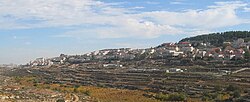Efrat
| |
|---|---|
| Hebrew transcription(s) | |
| • ISO 259 | ʔeprat, ʔepráta |
| • Also spelled | Efrata (previously) (official) |
 Efrat, 2012 | |
| Coordinates: 31°39′28.8″N 35°9′11.16″E / 31.658000°N 35.1531000°E | |
| Region | West Bank |
| District | Judea and Samaria Area |
| Founded | 1983 |
| Government | |
| • Head of Municipality | Oded Revivi |
| Area | |
• Total | 6,280 dunams (6.28 km2 or 2.42 sq mi) |
| Population (2022)[1] | |
• Total | 11,853 |
| • Density | 1,900/km2 (4,900/sq mi) |
Efrat (Hebrew: אֶפְרָת), or previously officially Efrata (Hebrew: אֶפְרָתָה), is an Israeli settlement in the West Bank, established in 1983 in the Judean Mountains. Efrat is located 12 kilometers (7.5 mi) south of Jerusalem, between Bethlehem and Hebron, 6.5 km (4 mi) east of the Green Line, at the Palestinian side of the West Bank wall.[2] The settlement stands at an altitude of up to 960 metres (3,150 feet) above sea level and covers about 6,000 dunam (1,500 acres).[3] The international community has largely viewed Israeli settlements in the West Bank, referred to by Israel as Judea and Samaria, as illegal under international law.[4] However, Israel disputes this interpretation and maintains that settlements are legal and consistent with international law, citing historical, legal, and security reasons. This position has been upheld by successive Israeli governments.[5]
Considered the capital of Gush Etzion,[6] it had a population of 11,853 in 2022. Although geographically located within Gush Etzion, it is independent from the Gush Etzion Regional Council, and Palestinians in negotiations do not consider it as part of that block, since it lies to the east of Route 60 — their side of the Geneva Initiative map.[6] Since November 2008, Oded Revivi, an attorney and lieutenant colonel in the army and member of the Likud Central Committee, is the head of Efrat regional council.[7]
- ^ "Regional Statistics". Israel Central Bureau of Statistics. Retrieved 21 March 2024.
- ^ "Efrata". Peace now. Archived from the original on 2011-09-27.
- ^ "The city of Efrat". Efrat Municipality Website. Archived from the original on August 9, 2011. Retrieved August 24, 2011.
- ^ "The Geneva Convention". BBC News. 10 December 2009. Retrieved 27 November 2010.
- ^ Gregory S. Mahler (2004). Politics and government in Israel: the maturation of a modern state. Rowman & Littlefield. p. 314. ISBN 978-0-7425-1611-3.
- ^ a b Jodi Rudoren, Jeremy Ashkenas,'Netanyahu and the Settlements,' The New York Times 12 March 2015.
- ^ Chaim Levinson (June 17, 2010). "Interview with Efrat regional council head Oded Ravivi. What's your position on settler violence?". Haaretz. Retrieved August 24, 2011.
